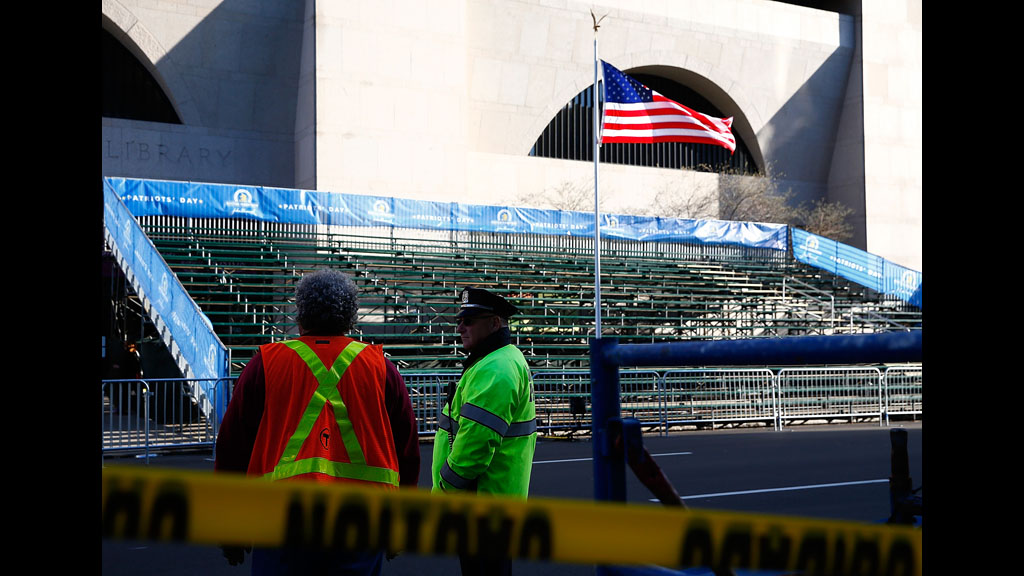BOSTON -- One year after a pair of homemade pressure-cooker bombs killed three people and wounded more than 260 others, turning a day of athletic triumph into one of tragedy, the Boston Marathon returns to the streets on Monday. For the 118th edition of the world's oldest annual marathon, security along the course will be tighter than ever.
As the sun rose over the center of Hopkinton, where the race starts, runners started to filter in early Monday morning, but the most obvious change was the heavy security presence. State and local police officers were everywhere, even on the rooftops of some buildings.
A bus dropping off runners had the words 'Boston Strong' on the electronic sign at the front that usually posts the bus's destination. A banner posted on a commercial building in Hopkinton read: 'You are Boston Strong. You Earned This.'
Spectators coming to the start line had to pass through police checkpoints.
'There'll be considerably more police presence,' Massachusetts Gov. Deval Patrick said Sunday on CBS' 'Face the Nation.' ''But we also don't want to have it, you know, kind of a race through a militarized zone. So it's about striking a balance, and I think we have struck that balance.'
Runners attending the event will have to use clear plastic bags for their belongings, and fans hoping to watch near the finish line are encouraged to leave strollers and backpacks behind. More than 100 cameras have been installed along the route in Boston, and 50 or so 'observation points' will be set up around the finish line 'to monitor the crowd,' the Boston Athletic Association said.
Patrick said there have been no specific threats against the race or the city for the Massachusetts holiday of Patriots' Day.
'We're not taking that as a sign to sort of stand down,' he said. 'We're very prepared, and we're assuring people as much as we can that it'll be a fun day and a safe one.'
About 36,000 runners have registered for the race - the second-largest field in its history, many of them coming to show support for the event and the city that was shocked by the attack on its signature sporting event. Race organizers expanded the field from its recent cap of 27,000 to make room for more than 5,000 runners who were still on the course at the time of the explosions, for friends and relatives of the victims and for those who made the case that they were 'profoundly impacted' by the attack.
Lelisa Desisa of Ethiopia and Kenya's Rita Jeptoo, who crossed the finish line on Boylston Street about three hours before the explosions, will return to defend their championships. Desisa returned to Boston last fall to donate his first-place medal to the city as a gesture of support.
Jeptoo, who also won the race in 2006, said she is hoping for a third victory - and one she can enjoy.
'It was very difficult to be happy. People were injured and children died,' she said of last year's marathon. 'If I'm going to win again, I hope I can be happier and to show people, like I was supposed to last year.'
Even as runners focused on the exhilaration of crossing the finish line, the festive atmosphere was inevitably tinged with sorrow a day ahead of the race as they picked up last-minute supplies.
Marathon runners were blessed at an emotional church service that celebrated Easter and remembered the victims, while heightened security measures, including bag checks, were in place at marathon events.
For years, state and local officials conducted a 'tabletop exercise' before the Boston Marathon, a meeting that allows them to study a map of the 26.2-mile course from Hopkinton to Boston's Copley Square and plan for emergencies that could arise during the race.
So many new people needed to attend the session this year that they moved it from the state's emergency bunker in Framingham to the a convention center in the city. The crowd grew from what usually is about 100 to more than 450, according to Boston Athletic Association executive director Tom Grilk, who is in charge of organizing the race.
'Whether you have a small group or a big group, the spirit is the same,' he said this month in an interview at the athletic association's office, about two blocks from the finish line. 'And that is: How do we get our event done well?'


